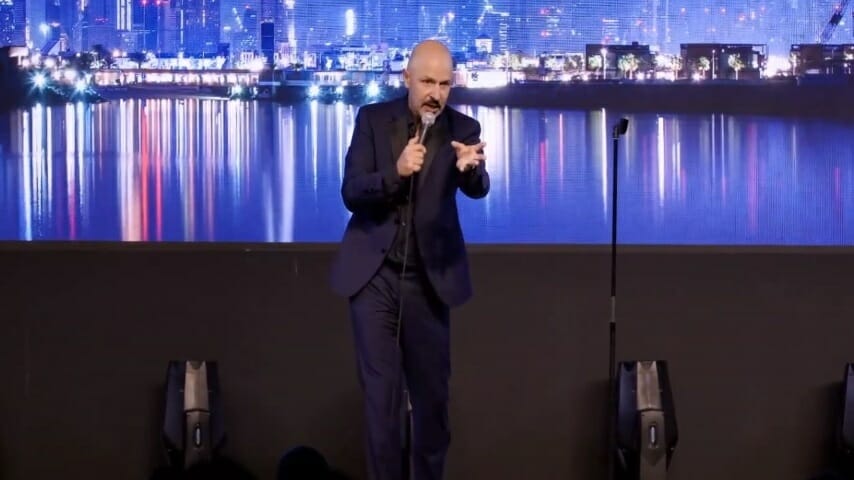Maz Jobrani’s Infectious Energy Doesn’t Always Translate to a Home Audience on Pandemic Warrior

Indoor shows with a live audience may seem like a distant notion these days (or not, depending on how much you care about your fellow man), but Maz Jobrani is offering us this novelty on Peacock. The Iranian-American comedian rose to prominence on the Axis of Evil Comedy Tour in the mid-2000s and has an extensive list of acting credits to his name, including roles in Superior Donuts and Better Off Ted. His latest stand-up special Pandemic Warrior, originally entitled Peaceful Warrior, was actually filmed in Dubai back in 2019. Jobrani sandwiches the set with segments filmed in a small room his daughter has creatively decorated with a teddy bear and toilet paper, filling us in on how his life has changed during coronavirus.
The start of the Dubai show mirrors the beginning of his 2017 Netflix special Immigrant (taped at the Kennedy Center), with Jobrani asking multiple audience members where they’re from. In both cases he seeks to highlight the diversity of each region—Dubai and Washington D.C., respectively—but for slightly different reasons. His 2017 special was, as the title suggests, all about the immigrant experience in America, which felt especially vital in the wake of Trump’s election. In Pandemic Warrior, Jobrani’s goal is slightly different but no less noble: he wants to break down stereotypes about Middle Eastern people.
For the most part, Jobrani achieves his aim, exploring the region from Lebanese protest DJs to censorship in Kuwait. He’s at his best when observing the idiosyncrasies between Middle Eastern cultures. However, while trying to deconstruct these stereotypes, Jobrani also perpetuates generalizations about other groups in the same breath, such as the assumptions that all Latinx people are good at soccer and people from Asia are proficient at the cello. These stereotypes may be positive, but as NPR’s Kumari Devarajan notes, “Once you buy that there’s a connection between race and ability, it’s a slippery slope to the bad stuff.” Beyond the harmful implications, he’s skilled enough at storytelling that it’s frustrating to see Jobrani employ jokes that lazily rest on generalizations.
-

-

-

-

-

-

-

-

-

-

-

-

-

-

-

-

-

-

-

-

-

-

-

-

-

-

-

-

-

-

-

-

-

-

-

-

-

-

-

-








































